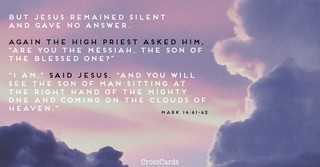- Recent Translations
- All Translations
Marco 14:1
Share
Settings
Marco 14:1 Meaning and Commentary
After two days was [the feast of] the passover
That is, two days after Christ had delivered the foregoing discourse concerning the destruction of the temple at Jerusalem, was the feast of the passover; which was kept in commemoration of God's passing over the houses of the Israelites, when he destroyed the firstborn of Egypt, and made way for the deliverance of the children of Israel from thence: and which was kept by eating the passover lamb; and which, properly speaking, is the feast of the passover:
and of unleavened bread;
which was the same feast with the other, called so from the unleavened bread which was then eaten; though with this difference, the passover lamb was only eaten on the first night, but unleavened bread was eaten for seven days together. The Syriac, Persic, and Ethiopic versions render it, "the passover of unleavened bread", leaving out the copulative "and".
And the chief priests and Scribes sought how they might take him by
craft;
that is, Jesus,
and put him to death:
for which purpose they assembled together in Caiaphas the high priest's palace, and there took counsel together how to accomplish it; see ( Matthew 26:2-4 ) .
